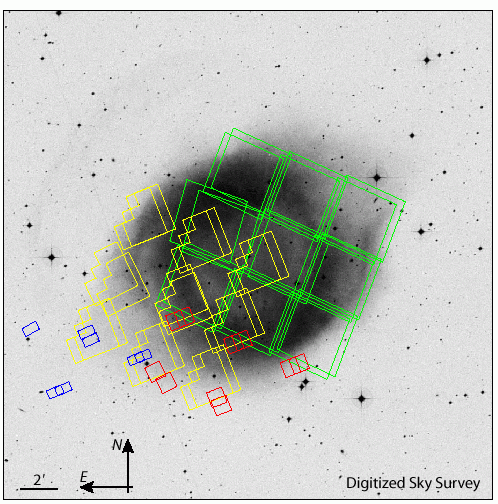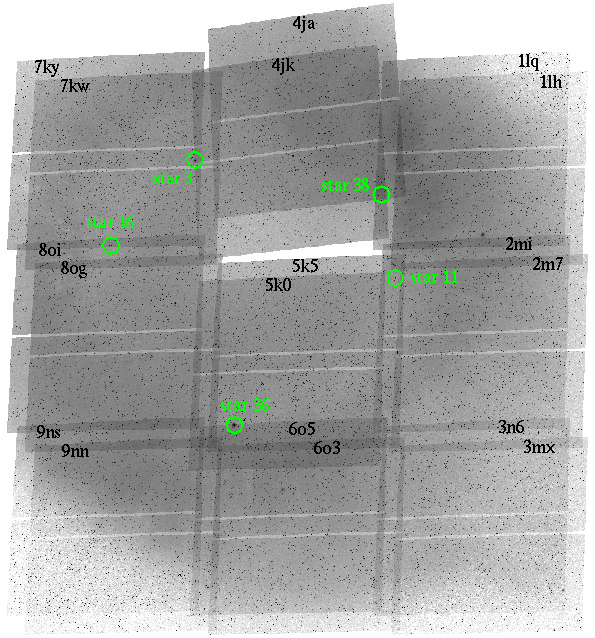|
|||||||||||||||||||
|
|
|||||||||||||||||||
The Hubble Helix
Observations


Following the prediction of a large flux of Leonid meteoroids during the November 2002 shower, the Hubble Space Telescope Project directed that HST be pointed directly away from the radiant during the expect ed peak, so as to minimize the exposed cross-section to the meteoroids. Fortuitously, the anti-radiant point lies within 1° .3 of the Helix Nebula (NGC 7293), one of the nearest and angularly largest of all planetary nebulae. Thus, our team at the Space Telescope Science Institute (STScI) took the opportunity to carry out an imaging campaign on the Helix Nebula during the nine-orbit Leonid stand-down. The resulting images have all been placed immediately in the HST Archive, where they are available for analysis by any interested astronomers. For safety's sake the MAMA detectors could not be used and the spacecraft's roll angle was fixed in order to minimize the solar panel's cross-section. The Hubble Helix data was produced by HST program 9700.
We were able to operate all four HST cameras simultaneously: the newly installed Advanced Camera for Surveys (ACS), the Wide Field Planetary Camera 2 (WFPC2), the Space Telescope Imaging Spectrograph (STIS), and the Near Infrared Camera and Multiobject Spectrograph (NICMOS). The nine pointings were optimized for contiguous coverage with ACS, leaving the other imagers pointing at adjacent sky regions. Since the Helix Nebula is too large to be covered completely, even in nine ACS pointings, we chose to image the nebula's core and northwest side. The gap in the middle of the ACS mosaic occurred because of an unexpected interaction between the SAME POS AS special requirement and the use of a subarray for the central star of the planetary nebula.
Summary of all the data obtained
| Instrument | Filter | Spectral Lines |
Number of Exposures On/Off Nebula |
Exposure Time On/Off Nebula (hours) |
| ACS/WFC | F658N | H-alpha 6562A + [N II] 6584A | 46/0 | 5.12/- |
| ACS/WFC | F502N | [O III] 5007A | 46/0 | 4.92/- |
| WFPC2 | F656N | H-alpha 6563A | 20/0 | 2.56/- |
| WFPC2 | F631N | [O I] 6300A | 18/0 | 2.35/- |
| WFPC2 | F469N | He II 4686A | 2/0 | 0.24/- |
| NIC3 | F212N | H2 2.12 microns | 12/4 | 2.20/0.71 |
| NIC3 | F187N | Pa-alpha 1.87 microns | 4/2 | 0.43/0.21 |
| STIS | F28X50OII | [O II] 3727A | 8/12 | 1.00/1.50 |
ACS exposure details
The following "road map" shows the relationship of the ACS F502N exposures listed below (similar for F658N) -- the exposure overlaps, interchip gaps, and the nebula. Also, the five "reg stars" (which appear on two tiles) are circled - their positional offsets (XDELTA,YDELTA) were used to refine the registration of the mosaic. Tile 5 was arbitrarily chosen to be the reference position (0,0) for adjacent tiles 2 and 6. Tile 4 was chosen to be the "offset" reference position (9,9) for tiles 1, 7, and 8. This offset between the tile 5 and tile 4 clusters was rather crudely measured using knots (since no stars are available) in the tile 1/2 overlap region. See the object catalog at the end of the Reductions page for details on the registration stars and other objects in the field. These other objects could be used to further refine the registration between the two exposures in each tile, and/or to align the entire mosaic with the Guide Star Catalog (or some other reference frame).
| image rootname | filter | exp line | exp time | target -tile |
WFC aperture RA | WFC aperture DEC | XPOS TARG |
YPOS TARG |
reg stars |
other stars |
input XDELTA pixels |
input YDELTA pixels |
notes |
| j8kr01lhq | F502N | 1.010 | 425 | NGC7293 -POS1 |
337.4111 | -20.7617 | 0.0 | 0.0 | - | - | 8.11 | 5.59 | reg with 1lq, galaxy also on 2m7 |
| j8kr01lqq | F502N | 1.021 | 425 | NGC7293 -POS1 |
337.4111 | -20.7617 | 20.0 | -20.0 | 38 | - | 8.11 | 5.59 | |
| j8kr02m7q | F502N | 2.010 | 425 | NGC7293 -POS2 |
337.3578 | -20.7829 | 0.0 | 0.0 | - | 31,37 | 5.85 | 1.10 | reg with 2mi, galaxy also on 1lh |
| j8kr02miq | F502N | 2.021 | 425 | NGC7293 -POS2 |
337.3578 | -20.7829 | 20.0 | -20.0 | 11 | 37 | 5.85 | 1.10 | |
| j8kr03mxq | F502N | 3.010 | 400 | NGC7293 -POS3 |
337.3045 | -20.8040 | 0.0 | 0.0 | - | 1,2,7, 10,39 |
7.67 | 2.25 | shifts are avg of tiles 2,6 |
| j8kr03n6q | F502N | 3.021 | 400 | NGC7293 -POS3 |
337.3045 | -20.8040 | 20.0 | -20.0 | - | - | 7.67 | 2.25 | shifts are avg of tiles 2,6 |
| j8kr14jaq | F502N | 14.012 | 410 | NGC7293 -POS4 |
337.4338 | -20.8116 | 0.3 | -63.6 | 38 | - | 8.45 | 6.91 | WCS not registered with 4jk? |
| j8kr14jkq | F502N | 14.021 | 410 | NGC7293 -POS4 |
337.4338 | -20.8116 | 20.0 | -20.0 | 3,38 | 3,38 | 9.00 | 9.00 | offset ref image for tiles 1,4,7,8; star 3 bleeding |
| j8kr05k0q | F502N | 5.012 | 410 | NGC7293 -POS5 |
337.3804 | -20.8327 | 20.0 | 20.3 | 36 | 14,18 | 0.00 | 0.00 | reference image for tiles 2,5,6 |
| j8kr05k5q | F502N | 5.020 | 460 | NGC7293 -POS5 |
337.3804 | -20.8327 | 0.0 | 0.0 | 11,36 | 14,18 | 0.00 | 0.00 | reference image for tiles 2,5,6 |
| j8kr06o3q | F502N | 6.011 | 510 | NGC7293 -POS6 |
337.3271 | -20.8539 | 0.0 | 0.0 | - | - | 9.49 | 3.40 | reg with 6o5, object 22 is a galaxy? |
| j8kr06o5q | F502N | 6.020 | 510 | NGC7293 -POS6 |
337.3271 | -20.8539 | 20.0 | -20.0 | 36 | 36 | 9.49 | 3.40 | star 36 saturated and bleeding |
| j8kr07kwq | F502N | 7.011 | 445 | NGC7293 -POS7 |
337.4564 | -20.8614 | 0.0 | 0.0 | 3,16 | 19,24 | 5.34 | 4.40 | star 3 saturated and bleeding |
| j8kr07kyq | F502N | 7.020 | 445 | NGC7293 -POS7 |
337.4564 | -20.8614 | 20.0 | -20.0 | 3,16 | 19,24 | 4.89 | 4.76 | star 3 saturated and bleeding |
| j8kr08ogq | F502N | 8.011 | 510 | NGC7293 -POS8 |
337.4031 | -20.8826 | 0.0 | 0.0 | - | 9,33,35 | 4.60 | 11.29 | reg with 8oi |
| j8kr08oiq | F502N | 8.020 | 510 | NGC7293 -POS8 |
337.4031 | -20.8826 | 20.0 | -20.0 | 16 | 9,33,35 | 4.60 | 11.29 | star 35 is a true 0.2" double star! |
| j8kr09nnq | F502N | 9.011 | 445 | NGC7293 -POS9 |
337.3498 | -20.9038 | 0.0 | 0.0 | - | 4,6,8,17 | 7.05 | 7.35 | shifts are avg of tiles 6,8 |
| j8kr09nsq | F502N | 9.020 | 445 | NGC7293 -POS9 |
337.3498 | -20.9038 | 20.0 | -20.0 | - | 4,6,8,17 | 7.05 | 7.35 | shifts are avg of tiles 6,8 |
| j8kr01lkq | F658N | 1.011 | 450 | NGC7293 -POS1 |
337.4111 | -20.7617 | 0.0 | 0.0 | - | - | 8.11 | 5.59 | reg with 1lm, galaxy also on 2ma |
| j8kr01lmq | F658N | 1.020 | 450 | NGC7293 -POS1 |
337.4111 | -20.7617 | 20.0 | -20.0 | 38 | - | 8.11 | 5.59 | |
| j8kr02maq | F658N | 2.011 | 475 | NGC7293 -POS2 |
337.3578 | -20.7829 | 0.0 | 0.0 | - | 31,37 | 5.85 | 1.10 | reg with 2me, galaxy also on 1lh |
| j8kr02meq | F658N | 2.020 | 475 | NGC7293 -POS2 |
337.3578 | -20.7829 | 20.0 | -20.0 | 11 | 37 | 5.85 | 1.10 | |
| j8kr03mzq | F658N | 3.011 | 445 | NGC7293 -POS3 |
337.3045 | -20.8040 | 0.0 | 0.0 | - | 1,2,7, 10,39 |
7.67 | 2.25 | shifts are avg of tiles 2,6 |
| j8kr03n3q | F658N | 3.020 | 445 | NGC7293 -POS3 |
337.3045 | -20.8040 | 20.0 | -20.0 | - | - | 7.67 | 2.25 | shifts are avg of tiles 2,6 |
| j8kr14jdq | F658N | 14.013 | 460 | NGC7293 -POS4 |
337.4338 | -20.8116 | 0.3 | -63.6 | 38 | - | 8.45 | 6.91 | WCS not registered with 4jf? |
| j8kr14jfq | F658N | 14.020 | 460 | NGC7293 -POS4 |
337.4338 | -20.8116 | 20.0 | -20.0 | 3,38 | 3,38 | 9.00 | 9.00 | offset ref image for tiles 1,4,7,8; star 3 bleeding |
| j8kr05k3q | F658N | 5.013 | 460 | NGC7293 -POS5 |
337.3804 | -20.8327 | 20.0 | 20.3 | 36 | 14,18 | 0.00 | 0.00 | reference image for tiles 2,5,6 |
| j8kr05kaq | F658N | 5.021 | 410 | NGC7293 -POS5 |
337.3804 | -20.8327 | 0.0 | 0.0 | 11,36 | 14,18 | 0.00 | 0.00 | reference image for tiles 2,5,6 |
| j8kr06o0q | F658N | 6.010 | 510 | NGC7293 -POS6 |
337.3271 | -20.8539 | 0.0 | 0.0 | - | - | 9.49 | 3.40 | reg with 6o9, object 22 is a galaxy? |
| j8kr06o9q | F658N | 6.021 | 510 | NGC7293 -POS6 |
337.3271 | -20.8539 | 20.0 | -20.0 | 36 | 36 | 9.49 | 3.40 | star 36 saturated and bleeding |
| j8kr07ktq | F658N | 7.010 | 445 | NGC7293 -POS7 |
337.4564 | -20.8614 | 0.0 | 0.0 | 3,16 | 19,24 | 5.34 | 4.40 | star 3 saturated and bleeding |
| j8kr07l2q | F658N | 7.021 | 445 | NGC7293 -POS7 |
337.4564 | -20.8614 | 20.0 | -20.0 | 3,16 | 19,24 | 4.89 | 4.76 | star 3 saturated and bleeding |
| j8kr08odq | F658N | 8.010 | 510 | NGC7293 -POS8 |
337.4031 | -20.8826 | 0.0 | 0.0 | - | 9,33,35 | 4.60 | 11.29 | reg with 8om |
| j8kr08omq | F658N | 8.021 | 510 | NGC7293 -POS8 |
337.4031 | -20.8826 | 20.0 | -20.0 | 16 | 9,33,35 | 4.60 | 11.29 | star 35 is a true 0.2" double star! |
| j8kr09nlq | F658N | 9.010 | 400 | NGC7293 -POS9 |
337.3498 | -20.9038 | 0.0 | 0.0 | - | 4,6,8,17 | 7.05 | 7.35 | shifts are avg of tiles 6,8 |
| j8kr09nvq | F658N | 9.021 | 400 | NGC7293 -POS9 |
337.3498 | -20.9038 | 20.0 | -20.0 | - | 4,6,8,17 | 7.05 | 7.35 | shifts are avg of tiles 6,8 |
| image rootname | filter | exp line | exp time | target -tile |
WFC aperture RA | WFC aperture DEC | XPOS TARG |
YPOS TARG |
reg stars |
other stars |
input XDELTA pixels |
input YDELTA pixels |
notes |
Maintained by the Hubble Helix Team. Send comments to mutchler@stsci.edu.
|
|
|




 Follow Us
Follow Us